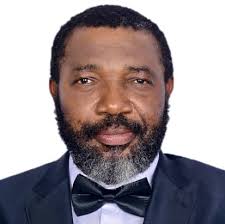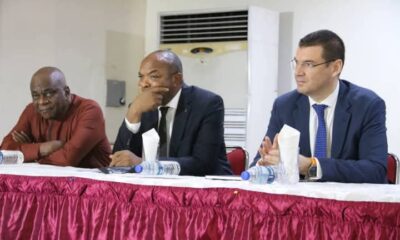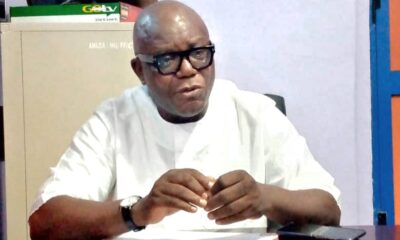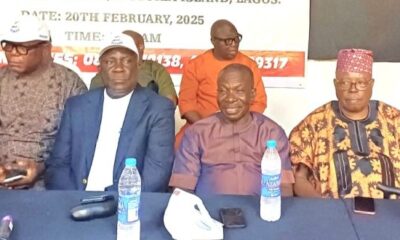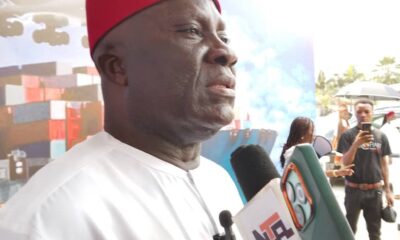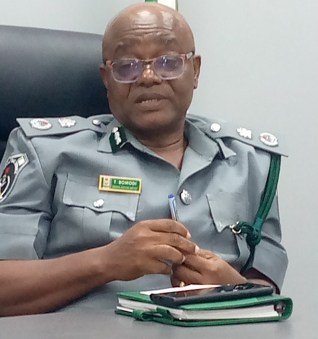Analysis
Should Oyetola Reorder Control of Cargo Scanners?
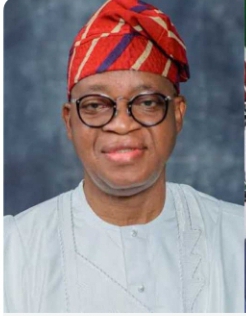
BY EGUONO ODJEGBA
Should Oyetola Reorder Control of Cargo Scanners?
BY EGUONO ODJEGBA
Feelers from the just concluded National Dialogue on the theme “Sailing to Success: Harnessing Nigeria’s Maritime Potential” indicate that the Minister of Marine and Blue Economy, Senator Adegboyega Oyetola is canvassing the decentralization of the cargo scanning system, with the purported proposal that terminal operators should own and operate cargo scanners.
The minister’s position which supposedly flowed from complaints by industry stakeholders about perceived lack of adequate scanning machines and or identified inefficiencies of their administration formed the nucleus of takeaway from the 29th National Economic Summit Group (NESG) held at the Transcorp Hilton Hotel Abuja on the 23rd October 2023.
According to an account, Oyetola said he would be seeking Presidential approval to mandate terminals operators to install scanning machines, which he believes will enhance the facilitation of cargo clearance, supposedly in line with global best practices.
Speaking on the efficient administration of the scanning machines earlier during the NESG programme, the National President of the Association of Nigerian Licensed Customs Agents (ANLCA), Mr Emenike Kingsley Nwokeoji was quoted to have said that cargo clearance in Nigerian ports is still a far cry from global standards.
Nwokeoji was said to have noted perceived inconsistency in the rules and guidelines relating to cargo clearing process, like the cancellation of rerouting, adjudged by clearing agents and freight forwarders to have been time saving; as against the prevailing practice where a cargo must arrive before clearance processes commence.”
The National President of ANLCA was also believed to have lamented lack of scanners as well as delays in cargo clearance, all of which he reportedly said engenders corruption and escalates costs of doing business at the port.
The ANLCA leader reportedly canvassed the immediate commencement of the scanning of cargoes directly from vessels before being been stacked at the terminals; onwards for immediate picking and exit.
Rather than consult further however, Oyetola on the spur of the moment pledged to seek the intervention of the presidency to grant approval for terminal owners to own and operate cargo scanners; despite that the Nigeria Customs Service last year spent hundreds of millions of naira to build and install a number of functional scanners across formations and commands of the service.
If the Oyetola model is allowed to fly, what would happen to the NCS scanners and the huge investments that have been made in the training and retraining of officers to handle the various aspects of the cargo scanning system?
Will the proposal should it become real not create a fresh round of confusion in the system and lead to disruption in the productivity level through cargo clearance?
Stakeholders have however reacted differently to the concerns of the minister of marine and blue economy, clearly divided on the issue and taking contrary positions, for and against.
While in his reaction, foremost customs broker and trusted maritime elder, Prince Olayiwola Shittu said the best and only acceptable solution should be a careful study of the administration of all the regimes of past cargo scanners, which should serve guide to making the right decision; former National President of the National Association of Government Approved Freight Forwarders (NAGAFF), Dr Eugene Nweke thinks otherwise.
Shittu was unequivocal as he notes that the Nigeria Customs Service exercise prerogative on the due assessment of scanning results, a position he opined cannot be negotiated or whished away.
“I agree with you, it will bring conflicts and the customs position in the matter of scanned goods is superior to that of the terminal operators. Customs is the owner of the port, whether we like it or not because what we have is customs port, even if the terminals scanned cargo, customs still have the right to ask the container to be positioned for further examination, for obvious reasons, abi?
“So l regard this one (ministerial thought) as akin to too many cooks spoiling the broth. What the minister should do is ask the federal government to empower customs to have more scanners, because they are the ones to supervise the scanning, if terminal operators buy the scanners and do the operation the result will not be acceptable to customs, except customs themselves handles it; let us face reality.
“We had this issue before, there was a time when scanners were installed by terminal operators, and it took them awhile to decide who will operate it…the terminal operators or customs. At the end of the day, we discovered that when goods are scanned, customs will still tell you issues about green, yellow and red outcomes, and you will still go and position for examination.
“So we are not getting it right, it is not by saying l want to go and meet the president, he should study what has happened so far and then come up with an idea that will stand the test of time, which will serve stakeholders and serve the national purpose, not just to take a sudden decision.”
But aligning with the ministerial idea, former National President of NAGAFF, Nweke said in global practice, cargo scanners can be operated from anywhere in the world, noting that Nigeria Customs should restrict itself to the interpretation and analysis of scanned images, by having a pool of well trained and professionally knowledgeable men in scanning analysis.
“You could recall , that I already outlined some of these issues in the previous write ups work l sent to you, as an advice to then CG Hameed Ali. And my position was that, depending on what the government wants the Customs to achieve with scanner installation, is the objective for security or trade facilitation? If not, professionally scanner can be installed anywhere in the world and scan images transmitted to the customs at whatever destination, this is the beauty of ICT.
“In this regards, what our customs should do is to master the act of analysis of scanned images submitted to them to determine the status of goods, where trade facilitation is the objective of scanner installations, if it is security, then, it goes beyond that.
“In the past it was the Scanner Service Providers that operated these scanners, such as Globalscan System, Cotecna, etc. Remember that former CGC, late Abdullahi Diko Inde (may his soul rest in peace) had issues with scanner service providers, which led to the management decisions to audit all the installed scanner and these pre-shipment inspection agents worked together and there was no problem until it was discovered that the scanners were all refurbished, and by that time he reported back to the Hon. Minister Okonjo Iweala and the President, the rest is now history.
“So what the minister of marine and blue economy seems to be driving at is to take us back to that era of Scanner Service Providers aka “food for the boys”. I rather think, it is advisable to state that, the Hon. minister should really settle down and stay off highly technically related issues as scanners and be mindful of acts that add up to cost of doing business in the ports.
Nweke further explained that scanner installations do not constitute key components of the blue economy evolution, as enunciated by the African Integrated Maritime Strategy of the African Union.
Also commenting, Mr Okey lbeke, Principal Partner, Blue-Waters Maritime Resources LTD cautioned new political appointees of the present administration to tread softly and focus on the task of first of all understudying the sector before engaging in hasty pronouncements that can lead to distractions and other unintended negative consequences; noting that the industry scanning system has come a long way and is fully integrated in the port processes and therefore, should be respected.
He said, “Saying the cargo scanning system should be strengthened is not the same thing as calling for the redistribution of its management, the minister has taken the matter out of contest, sadly, no one drew his attention to the obvious erroneous path he wants us to travel.
“Have you forgotten that the immediate past minister of finance, Mrs. Zainab Ahmed announced the approval of USD100million scanners acquisition fund by the federal executive council (FEC)? Early this year too, Col. Hammed Ali Rtd, then Customs CG announced that the scanners have arrived the country and are been installed alongside trained scanning officers, so we have a robust scanning system in place, it is part of the tools of the E-Customs project.
“The minister should listen more at this stage, he should listen and focus on understanding the basic foundations of the sector before making pronouncements, he should not allow overzealous industry individuals push or manipulate him into saying things he is not sure of yet.”
It will be recalled that on Wednesday, the Customs Area Controller of Tin Can Island, Comptroller Dera Nnadi mni, said that freight forwarders and clearing agents were not optimizing the benefits of the cargo scanners procured and installed at a huge cost by the federal government.
In fact, he said those who stridently canvassed the use of scanning machines have begun to treat the same machines with dislike and trying to bypass them, he revealed, during a chat with members of the League of Maritime Editors (LOME) in his office, when the later paid him a courtesy visit.
According to the Tin Can Customs boss, the only panacea to seamless cargo clearance is honest declaration, which he explains also, holds the solution to overcoming the controversial regime of multiple interventions and alerts.
“In the meeting we held yesterday with stakeholders and other government agency, on the challenges of multiple interventions in cargo clearing process, l told them it is an embarrassment that close to 20 years we are still discussing the same issue. I cited an example for them, l said if the customs risk management our CRS throws up red on PAAR about a particular container, then there is reasonable ground for suspicion that the right thing has not been done.
“And a customs officer examines that container and says everything is right, l expect that the next CRF is green. If you bring 100 containers and examine them, and then l return verdict that you complied, duty was paid correctly, items imported are correct; l expect the next batch of PAAR that will come to be green. So l asked them yesterday, how come every PAAR issued, over 70percewnt or more still turns out to be red over the years and yet you complain that there are interventions in the system.
“I said please can we talk to our importers to do the right so we can change this narrative? Let our risk levels tend towards green, even for the few that we said are okay, there are some reasonable grounds not to be suspected, go to the orange, yellow for scanning.
All of you were’ here when l was in NIPPS , almost every newspaper report, agents were saying ‘give us scanners, give us scanners’, now the scanners have been brought, people are saying the scanners are delaying, “we don’t want to go to scanners…”, so l asked them, what do you people really want?”

